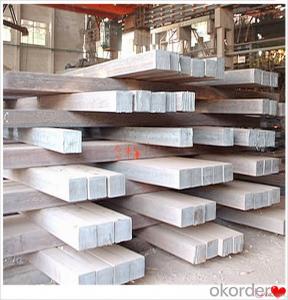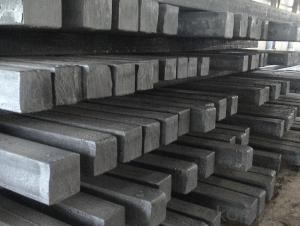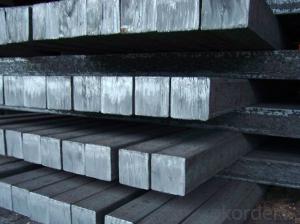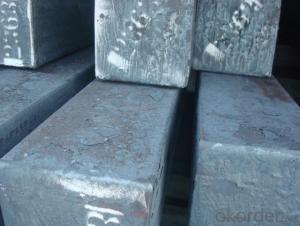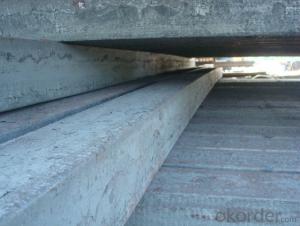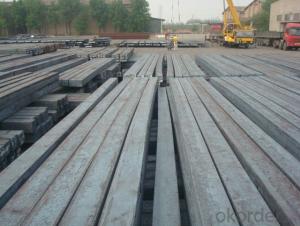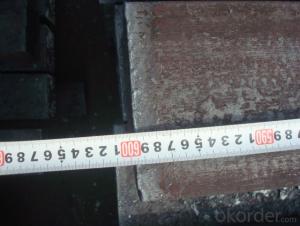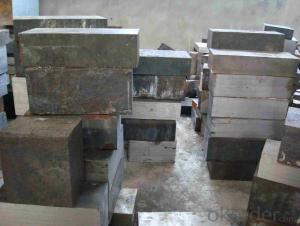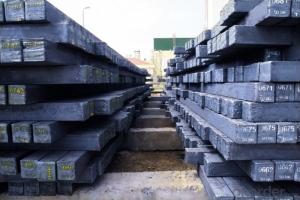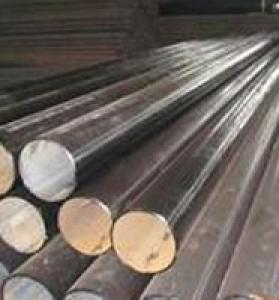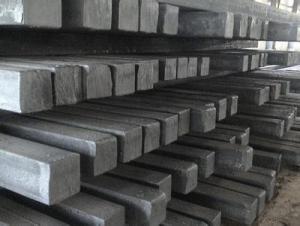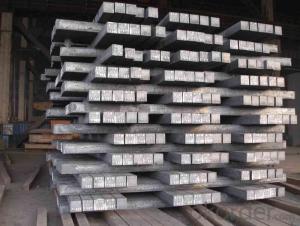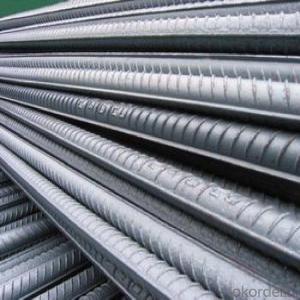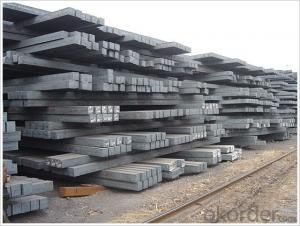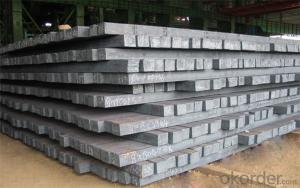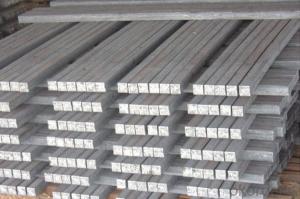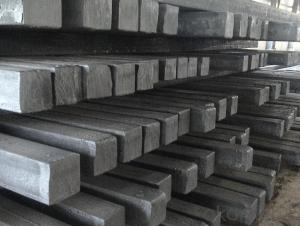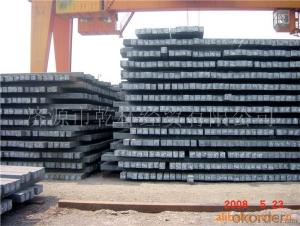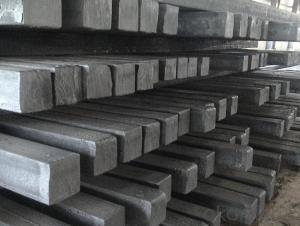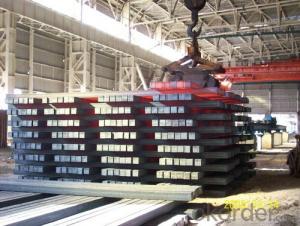Steel Billet Steel Camshaft Q235,Q255,Q275,Q345,3SP,5SP,20MnSi
- Loading Port:
- China main port
- Payment Terms:
- TT OR LC
- Min Order Qty:
- 20 m.t.
- Supply Capability:
- 200000 m.t./month
OKorder Service Pledge
OKorder Financial Service
You Might Also Like
Steel Billet Steel Camshaft Q235,Q255,Q275,Q345,3SP,5SP,20MnSi
Specification
Steel billet(ingot) by cogging or breakdown of semi-finished products, is the raw material of all kinds of steel mill. Billet section of square, round, flat, rectangular and abnormity of several kinds of, mainly related to the shape of rolled products.
CNBM Q235,Q275,Q345,3SP,5SP,20MnSi Billets Steel
Hot Rolled Steel Billets/ Mild Steel Bar/ Billet Steel
Specification (see below)
Standard: GB/JIS/ASTM
Size: 50*50mm-180*180mm
Length: 3-12mtrs or Customised
Steel material: Q235,Q255,Q275,Q345,3SP,5SP,20MnSi
Technique: Hot rolled
FOB Unit Ton Price $250-350 and Usually I will quote you CFR price.
MOQ: Usually 1000-10000MT/size
Shipment:By Container,Bulk Vessel
Packaging Details: bundles with steel strips or as customers's requirements
Delivery time: Usually within 30 days after the deposit/LC
Inspection:Third party inspection before loading.
Technical data
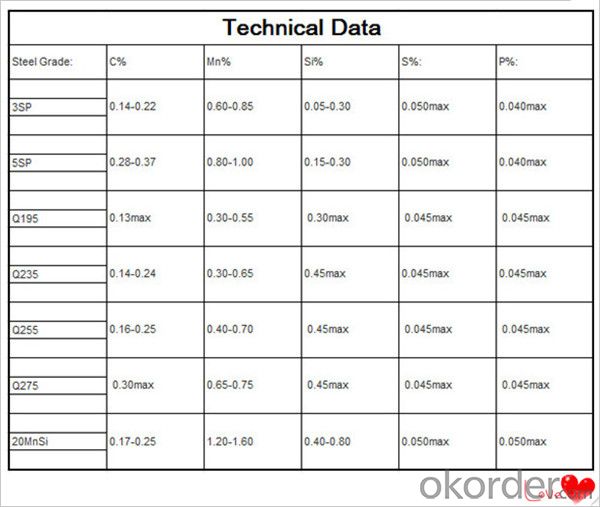
Feature Steel Billet
Rectangular billet continuous casting billet and mainly general carbon steel, low carbon low silicon cold-rolled material, high quality carbon structural steel, high strength low alloy steel, special steel, etc.
The billet is mainly divided into two kinds from the shape:
Slab: cross section width and height of the ratio of the larger, mainly used for rolling plate.
Billet: equal cross section width and height, or a huge difference, mainly used for rolling steel, wire rod. ,
Steel billets have distinct characteristics as compared with already furnished steel bars and products. Billets have a specific grain structure, which enables the metal to be processed more intricately. Steel billets are also known for their malleability and ductility, especially when exposed to varying temperatures during shaping and molding.
Packaging & Shipping
1. Packaging:
1) Small size: in bundles
2)Big size: in bulk
3)in plastic packing or as per customer requirement
2. Delivery time:
1) Normal size: within 7days send from warehouse directly
2) Special size: with 25-30days customer made for you
3. Trade terms:FOB/CFR/CIF
4. Shippment:
1) length:≤5.8m loaded in 20FT Container with 25-27tons
2) length:≤11.8m loaded in 40FT Container with 25-27tons
3) lengnth:≥12m shipped by bulk vessel, FILO terms
Steel Billet Images
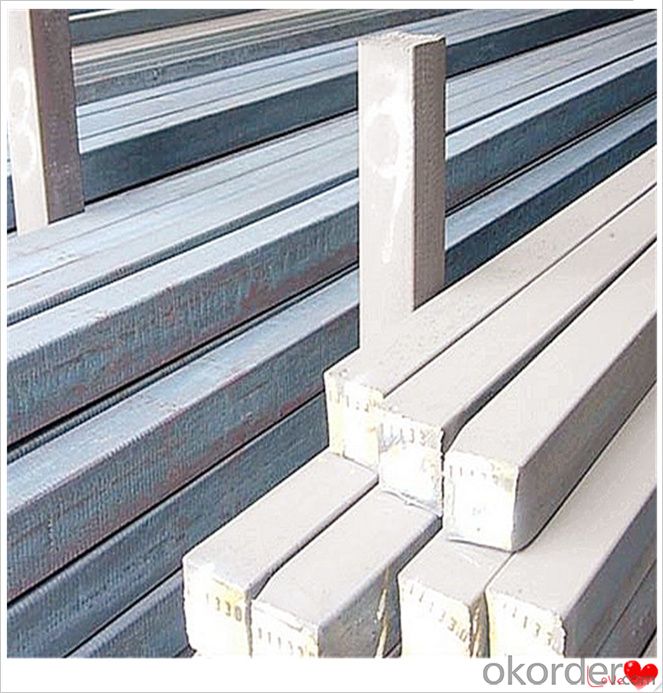
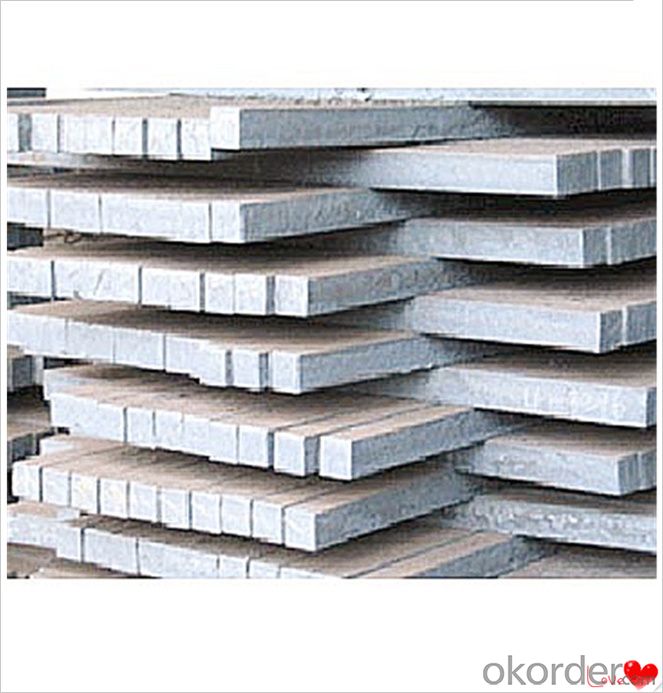
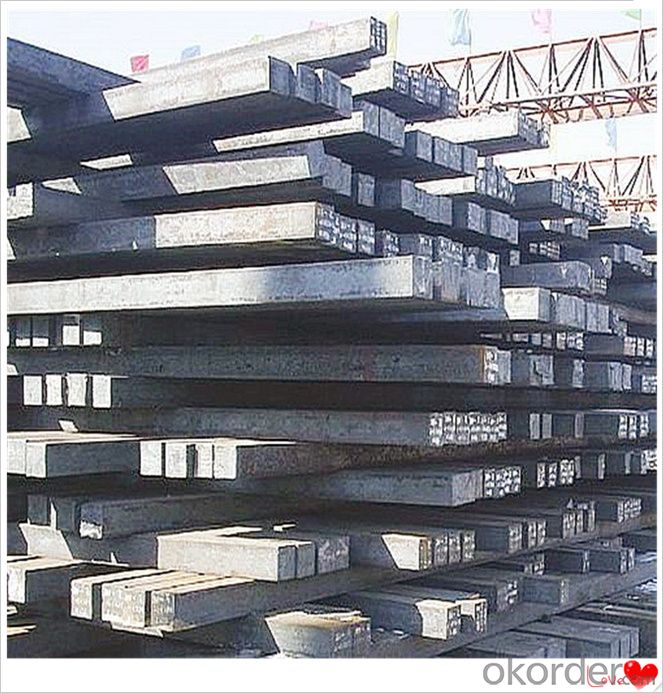
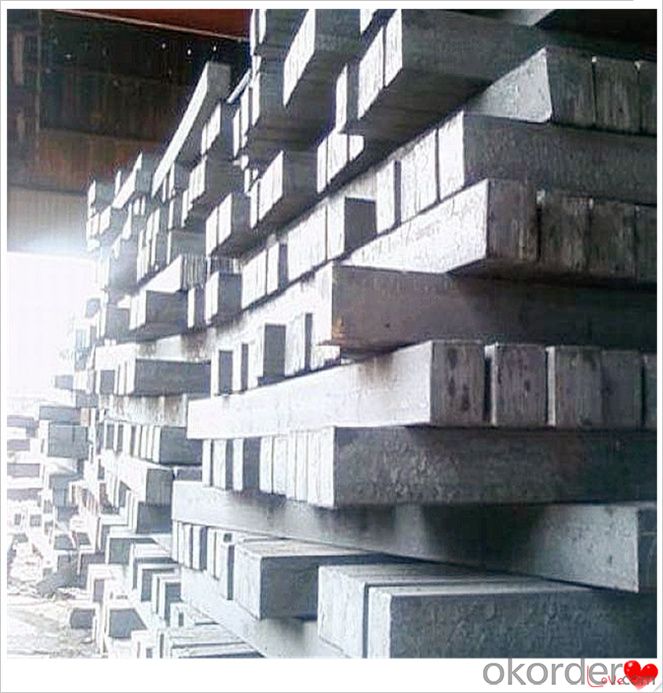
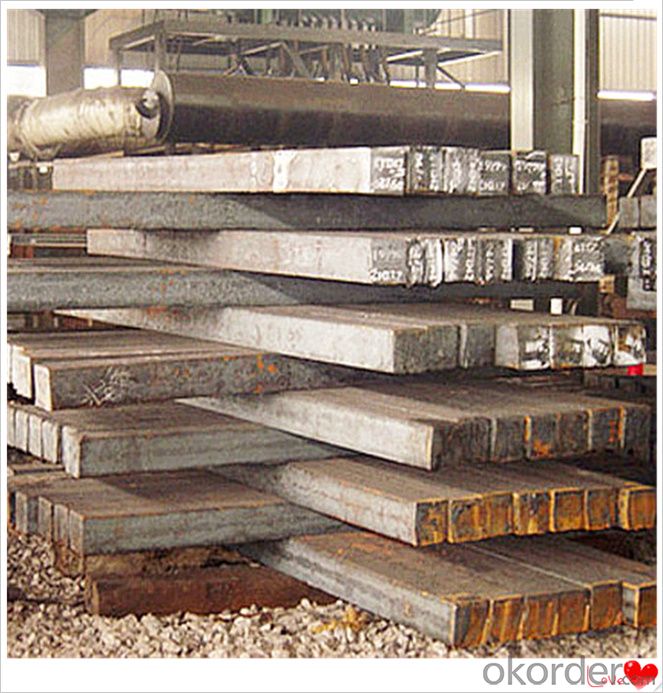
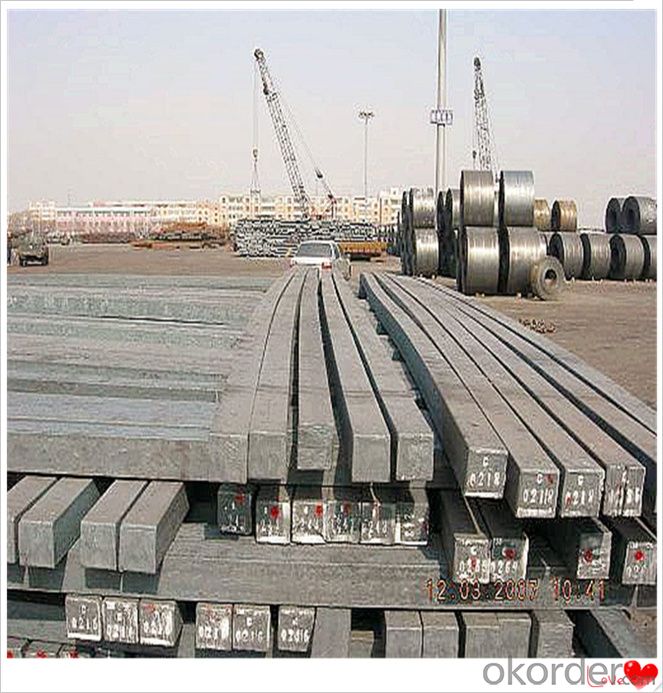
Processing
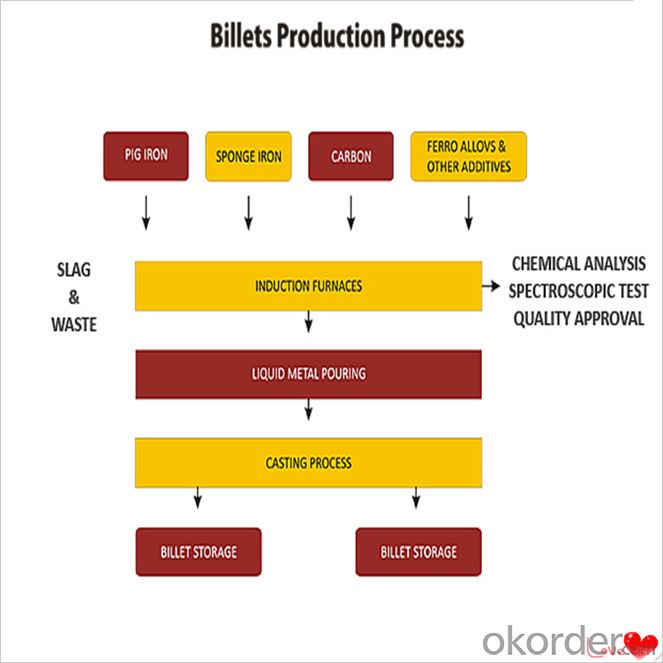
Usage-Billet Steel
Used for the plant, the bridge,shipment building high-rise building construction,lifting and transportation machinery, equipment manufracturing base building the support foundation pile manufacturing.
Billets, or ingots (as they sometimes referred to), are not of practical use until they have been formed into more functional shapes and sizes. While they have already been put in the furnace, they still require a series of shaping and molding procedures such as hot and cold working, milling and cutting before they are sold in hardware stores, or used for different applications. The unformed billets, however, can be used in striking currency such as coins and as reserves, similar to gold bars.
FAQ-Billet Steel
We have organized several common questions for our clients,may help you sincerely:
1) How about your company?
A world class manufacturer & supplier of castings forging in carbon steel and alloy steel,is one of the large-scale professional investment casting production bases in China,consisting of both casting foundry forging and machining factory. Annually more than 8000 tons Precision casting and forging parts are exported to markets in Europe,America and Japan. OEM casting and forging service available according to customer’s requirements.
2) How to guarantee the quality of the products?
We have established the international advanced quality management system,every link from raw material to final product we have strict quality test;We resolutely put an end to unqualified products flowing into the market. At the same time, we will provide necessary follow-up service assurance.
3) How long can we receive the product after purchase?
In the purchase of product within three working days, We will arrange the factory delivery as soon as possible. The pecific time of receiving is related to the state and position of customers.Commonly 7 to 10 working days can be served.
4)Do you have your own QC department?
Yes, we have, our QC department will inspect the goods during the process of mass production and after completion of production.
hot sale!!! Cast Steel Grades/ mild steel bar/ billet steel
(1): High quality steel with reasonable price.
(2): Wide excellent experiences with after-sale service.
(3): Every process will be checked by responsible QC which insures every product's quality.
(4): Professional packing teams which keep every packing safely.
(5): Trial order can be done in one week.
(6): Samples can be provided as your requirements.
- Q:What are the specifications for stainless steel billets used in the food industry?
- To ensure safety and hygiene, the food industry requires stainless steel billets to meet specific specifications. These specifications focus on the stainless steel's composition, corrosion resistance, and ability to withstand high temperatures and aggressive cleaning agents. First and foremost, stainless steel used for food industry billets must contain a high percentage of chromium, typically ranging from 16% to 18%. This high chromium content ensures excellent corrosion resistance, preventing any reaction with food or cleaning agents. In addition, these billets should have a low carbon content, usually below 0.08%. By keeping the carbon content low, the stainless steel becomes less susceptible to sensitization, which can cause corrosion and contamination of food products. Furthermore, the stainless steel billets must adhere to specific international standards, such as ASTM A276 or EN 10088. These standards outline the minimum requirements for chemical composition, mechanical properties, and surface finish. Moreover, the surface finish of the billets is crucial in the food industry. It must be smooth and free from defects like pits or cracks to prevent the accumulation of bacteria and facilitate easy cleaning. The dimensions of the billets also contribute to their suitability for the food industry. They are commonly available in square or rectangular shapes, with various sizes depending on the specific application. Lastly, these billets should be certified and compliant with industry regulations, such as those set by the Food and Drug Administration (FDA) or the European Food Safety Authority (EFSA). In conclusion, stainless steel billets used in the food industry must meet specific requirements regarding chromium and carbon content, international standards, surface finish, dimensions, and industry regulations for safety and hygiene.
- Q:What are the main applications of steel billets in the aerospace industry?
- Steel billets are primarily used in the aerospace industry for the manufacturing of critical components such as engine parts, landing gears, structural components, and fasteners. These billets provide the necessary strength, durability, and resistance to extreme conditions that are essential in the aerospace sector.
- Q:What are the different methods of steel billet surface grinding?
- There are several methods of steel billet surface grinding, including abrasive grinding, belt grinding, and centerless grinding.
- Q:Are steel billets subject to any regulations or certifications?
- Yes, steel billets are subject to various regulations and certifications. These regulations and certifications ensure that the steel billets meet specific quality standards, safety requirements, and environmental regulations. Some common certifications include ISO 9001 for quality management systems, ISO 14001 for environmental management systems, and certifications from industry-specific organizations like the American Society for Testing and Materials (ASTM) or the International Organization for Standardization (ISO). Additionally, steel billets may need to comply with specific regulations in the country or region where they are produced or used, such as building codes or product safety regulations.
- Q:How are steel billets used in the production of oil and gas components?
- Steel billets are an essential component in the production of oil and gas components due to their strength, durability, and ability to withstand extreme conditions. These billets are used as raw materials in various manufacturing processes to create various equipment and parts required in the oil and gas industry. One common application of steel billets in oil and gas production is in the manufacturing of pipes and casings. These billets are heated and then rolled or forged into seamless or welded pipes, which are used for transporting oil and gas from wells to refineries or distribution centers. The high strength of steel billets ensures that these pipes can withstand the high pressure and corrosive nature of the substances being transported. Steel billets are also used in the production of valves, flanges, and fittings that are critical components in oil and gas infrastructure. These billets are machined or forged into various shapes and sizes to create these components, which are used to control the flow of oil and gas within the pipelines or at different stages of the production process. The durability and resistance to corrosion of steel billets make them ideal for these applications, as they can withstand the harsh conditions often encountered in oil and gas operations. Furthermore, steel billets are utilized in the production of drilling equipment such as drill bits, drill collars, and drill pipes. These billets are often treated with heat or alloying elements to enhance their strength and wear resistance. The resulting components are capable of withstanding the intense forces and abrasion encountered during drilling operations, ensuring efficient and reliable extraction of oil and gas reserves. Overall, steel billets play a vital role in the oil and gas industry by providing the necessary raw materials to manufacture durable and high-performance components. Their strength, durability, and resistance to corrosion make them an ideal choice for the challenging conditions encountered in the production, transportation, and processing of oil and gas.
- Q:What is the role of steel billets in the manufacturing of industrial boilers?
- Steel billets play a crucial role in the manufacturing of industrial boilers. These billets serve as the raw material from which the various components of the boiler are formed. Industrial boilers are complex structures that require high-quality, durable materials to withstand the harsh conditions they operate in. Steel billets are typically made from carbon steel or alloy steel, which possess excellent strength and corrosion resistance properties. These billets are first heated and then shaped into different forms, such as plates, tubes, or rods, through processes like rolling, extrusion, or forging. These formed components are then further processed and assembled to create the boiler. In the manufacturing process, steel billets are used to fabricate important boiler components, such as the shell, tubes, and flues. The shell, made from steel plates, provides the main body of the boiler, while the tubes and flues allow for the passage of hot gases and water. Steel billets ensure the structural integrity of these components, as they can withstand high temperatures and pressures without deforming or failing. Moreover, steel billets are also used to create other auxiliary components of industrial boilers, including supports, brackets, and fittings. These components are crucial for the proper functioning and installation of the boiler, ensuring stability, efficiency, and safety. Overall, steel billets are essential in the manufacturing of industrial boilers as they provide the necessary strength, durability, and versatility required to withstand the demanding conditions of operation. The use of high-quality steel billets ensures that the boilers are reliable, long-lasting, and capable of meeting the rigorous performance standards expected in industrial applications.
- Q:What are the main factors affecting the creep resistance of steel billets?
- The main factors affecting the creep resistance of steel billets include the composition of the steel, the temperature at which the billets are exposed, the applied stress, and the microstructure of the steel.
- Q:How are steel billets used in the production of construction equipment?
- Steel billets are used as a primary raw material in the production of construction equipment, serving as the foundation for creating various components and parts. These billets are heated and molded into specific shapes through processes like forging or casting, enabling the creation of durable and robust structures. The resulting steel components, such as frames, chassis, and structural supports, provide the necessary strength and stability required in construction equipment, ensuring their ability to withstand heavy loads and harsh working conditions.
- Q:What are the potential applications of steel billets in the oil and gas industry?
- Steel billets have various potential applications in the oil and gas industry. They can be used for manufacturing pipes, tubes, and casings, which are essential for drilling and extraction operations. Steel billets are also used to produce valves, fittings, and other components that are necessary for the transportation and storage of oil and gas. Additionally, steel billets can be utilized in the construction of offshore platforms and equipment, providing durability and strength in harsh marine environments.
- Q:How do steel billets contribute to the shipbuilding industry?
- The shipbuilding industry heavily relies on steel billets, which have a significant role in the construction of ships. These semi-finished products are molten steel that has solidified into a specific shape, usually a square or rectangular block. They are obtained through continuous casting or ingot casting. Steel billets play a crucial role in providing the raw material for fabricating various ship components. These billets undergo further processing, such as rolling, forging, or extrusion, to create different structural elements like plates, beams, angles, and channels. These components are then used in constructing the ship's hull, decks, bulkheads, and other structural parts. Moreover, steel billets possess advantageous properties that make them ideal for shipbuilding. Their high strength and durability ensure the ship's structural integrity and longevity, enabling it to withstand the harsh marine environment and constant exposure to seawater. Additionally, steel billets have excellent weldability, facilitating efficient and reliable joining of different components during ship assembly. Furthermore, the use of steel billets in shipbuilding offers a cost-effective solution. Steel is readily available and abundant, making it a cost-efficient material choice for ship construction. Furthermore, steel is highly recyclable, allowing for the reuse of steel billets and reducing environmental impact. In conclusion, steel billets are essential in the shipbuilding industry as they provide the raw material for fabricating various ship components. Their high strength, durability, weldability, and cost-effectiveness make them an ideal choice for constructing ships that can withstand the demanding marine environment. Ultimately, steel billets contribute to the safe and reliable operation of ships, supporting the growth and development of the shipbuilding industry.
1. Manufacturer Overview |
|
|---|---|
| Location | |
| Year Established | |
| Annual Output Value | |
| Main Markets | |
| Company Certifications | |
2. Manufacturer Certificates |
|
|---|---|
| a) Certification Name | |
| Range | |
| Reference | |
| Validity Period | |
3. Manufacturer Capability |
|
|---|---|
| a)Trade Capacity | |
| Nearest Port | |
| Export Percentage | |
| No.of Employees in Trade Department | |
| Language Spoken: | |
| b)Factory Information | |
| Factory Size: | |
| No. of Production Lines | |
| Contract Manufacturing | |
| Product Price Range | |
Send your message to us
Steel Billet Steel Camshaft Q235,Q255,Q275,Q345,3SP,5SP,20MnSi
- Loading Port:
- China main port
- Payment Terms:
- TT OR LC
- Min Order Qty:
- 20 m.t.
- Supply Capability:
- 200000 m.t./month
OKorder Service Pledge
OKorder Financial Service
Similar products
New products
Hot products
Related keywords
